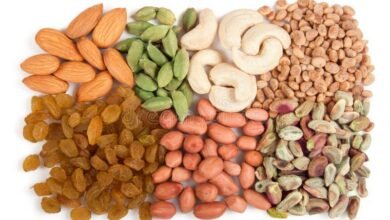The 7 Best High-Protein Foods to Eat for Breakfast

Several classic breakfast foods, such as cereal, bagels, toast, and pastries, are heavy in carbs and low in protein. It seems sense to gravitate toward these meals, particularly when they provide a rapid energy boost. But since carbohydrates digest fast, you’ll feel hungry again very quickly.
Including High-Protein Foods in your breakfast has several advantages, such as boosting your feeling of fullness and contentment. Furthermore, protein is necessary for general health. The majority of our cells, organs, and muscles are made of protein. Dietitian Dish LLC CEO Patricia Kolesa, M.S., RDN, states, “Since our bodies are constantly changing, it’s best to spread your protein intake throughout the day to support your body’s needs.” First things first, make sure your breakfast includes meals strong high-protein foods.
We discussed which foods high in protein to eat more of and how to include them in your morning meal with Kolesa and other nutrition specialists.
Read More : The Incredible 9 Health Benefits of Tomatoes: A Nutrient-Packed Superfood
Benefits of Eating Protein at Breakfast
Provides Long-Lasting Energy
Protein stays with you whereas carbohydrates may provide a short-term energy boost. The owner of Nutrition Education RD, Catherine Karnatz, M.P.H., RD, notes that while protein-rich meals take longer for our systems to digest, they will keep us feeling full and satisfied longer than if we merely grab a piece of fruit for breakfast.
According to registered dietitian and certified diabetes care and education specialist Lilian Nwora, RD, CDCES, “protein can also minimize snacking before lunch and prevent overeating later in the day” since consuming protein at breakfast helps you feel full and content for longer.
Aids in Managing Blood Sugar
Breakfast high in protein has been shown to help control blood sugar levels.”Eating protein for breakfast can help prevent brain fog and a midmorning crash by stabilizing blood sugar levels,” Nwora explains.
Even better, there are long-term advantages. Eliza Whitaker, M.S., RDN, a registered dietitian and medical nutrition expert at Dietitian Insights, continues, “A high-protein breakfast has also been shown to reduce post-meal blood glucose levels after lunch and dinner.” She also makes the point that lowering blood sugar increases after meals may lower the chance of heart disease.
Improves Heart Health
Breakfast protein consumers are often in better cardiac health. Making informed protein diet choices is crucial since some protein sources include good unsaturated fats that support normal cholesterol levels. Increased HDL (good) cholesterol and reduced blood pressure have been linked to eating more protein at breakfast, according to registered dietitian Sheri Gaw, RDN, CDCES, a spokesman for Dietitian Insights.
Builds and Repairs Muscle
Consuming protein at breakfast and throughout the day contributes to maintaining a lean body mass and preventing muscle loss. “Eating a high-protein breakfast may help you refuel and assist muscle development and recovery if you work out first thing in the morning,” advises Karnatz.
Best High-Protein Foods to Eat for Breakfast
Greek Yogurt
“Eating a dish of Greek yogurt for breakfast is a guaranteed way to start your day with a substantial amount of filling protein,” advises Gaw. Your morning meal will have 20 grams of protein if you have a 7-ounce container of plain Greek yogurt.
Probiotics may also be found in Greek yogurt. “Probiotics help maintain a healthy gut microbiota, which may improve immunity, lower the risk of chronic illness, and reduce systemic inflammation,” says Gaw.
Cottage Cheese
Because cottage cheese is strong in protein, it has lately become more and more popular on social media. A cup of cottage cheese has around twenty-five grams of protein. According to Kolesa, cottage cheese is a fantastic option as it is a wonderful source of calcium, potassium, and vitamin B12.
Cottage cheese has many uses and tastes well both savoury and sweet. “Use as part of a fruit bowl, spread on top of whole-grain toast, or add a savoury flavour to scrambled eggs,” recommends Kolesa. We really like our snack jar with cottage cheese.
Eggs
With all nine of the necessary amino acids that your body is unable to produce on its own, eggs are a complete supply of protein. Six grams of protein are included in each egg. According to Nwora, eggs are a reasonably priced and adaptable option to increase the protein in your meal. For a low-fat, high-protein breakfast, she recommends our Shakshuka with Roasted Tomatoes or an omelet.
Tofu
Though it may not be the first thing that springs to mind when thinking of breakfast dishes, tofu is a flexible component that works well in almost any recipe.
There are 22 grams of protein and less than 2 grams of saturated fat in a half-cup (126 grams) of tofu.Whitaker claims that it’s a lean, high-protein substitute for conventional eggs and dairy products for a healthy start to the day. She continues, “You also get plant-based probiotics for gut health and unsaturated fats to support your heart.” Studies reveal that the many health advantages of tofu are attributed to plant chemicals called isoflavones.
Salmon
With 17 grams of protein per 3-ounce meal, salmon is an excellent source of protein. It also contains high levels of vitamin D, omega-3 fatty acids, and other elements that promote general health. By decreasing cholesterol, reducing inflammation, and increasing blood vessel elasticity, omega-3 fatty acids may enhance heart health.
Ground Turkey
Not only is ground turkey a terrific alternative for lunch and supper meals, but it’s also a lean source of protein for breakfast! The protein content of a 4-ounce portion of 93%-lean ground turkey is 20 grams.Additionally, it offers vital elements including zinc, selenium, and B vitamins.
Because ground turkey has less saturated fat than bacon and sausage, it makes a terrific substitute in omelets, scrambles, and breakfast casseroles. For even more ease, use leftovers from the previous evening.
Ready-to-Drink Protein Shakes
Although the majority of dietitians advise putting food first when it comes to nutrition, protein shakes are a practical choice for hectic mornings. It’s OK to use a protein supplement for an extra boost if you’re getting most of your protein from diet.
Twenty to thirty grams of protein are included in most ready-to-drink protein smoothies. Nwora advises utilizing a protein shake as a creamer in your coffee or as the milk for your cereal. “They work well for your early commute. In an emergency, you can even carry them in your vehicle, wallet, or bag for breakfast, the woman adds.
Read More : From Weight Loss to Immunity: 11 Remarkable Health Benefits of Grapefruit
An essential ingredient that need to be included in every meal is protein. It gives you sustained energy, so you feel satiated and fuller for longer. Regular breakfast protein eaters had superior blood sugar regulation and heart health. For your morning meal, try to incorporate items like eggs, salmon, ground turkey, and tofu. A balanced breakfast should have protein, fat, carbohydrates, and fibre.











